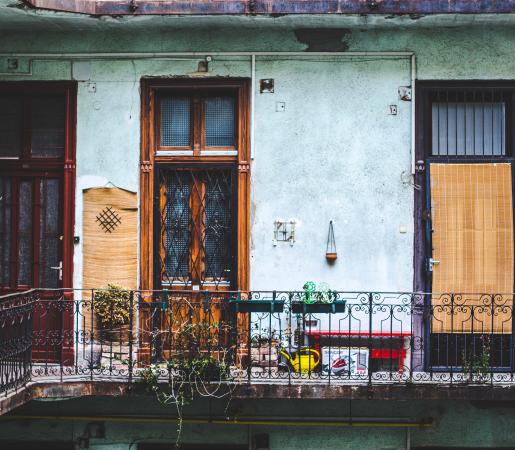
Budapest
AHA Budapest - Affordable Housing for All
About the project
Like many European cities, Budapest faces an energy crisis, which exacerbates an ongoing housing affordability crisis, and exposes new social groups to energy poverty and housing insecurity. In addition, the city’s social housing sector has been marginal, shrinking, and in disrepair for decades. To tackle this challenge, Budapest strives for a more attractive, resilient, and inclusive social housing system.
AHA develops an integrated service model which combines the repurposing of an unused non-residential public building into near-zero energy social housing and a unique early warning system to identify and support households at risk of energy poverty and housing exclusion. An experimental support scheme promotes flexible housing options, such as cohabitation and flat exchange arrangements for at-risk households. For example, homeowners living in oversized dwellings can share their home with those who cannot otherwise afford their own home. A revolving fund for providing retrofitting grants focused on energy-efficiency is also being tested.
The participation of tenants and other local citizens is actively encouraged, for example through inclusive design of the low-cost, aesthetic modular interiors planned for the new social housing stock.
Ultimately, AHA aims to demonstrate a scalable solution for addressing challenges of energy poverty and housing exclusion, which repositions social housing as a financially stable, green, and aesthetic sector. The AHA consortium and its broader partnership covers a wide range of stakeholders, including knowledge institutions, professional NGOs, and private organisations (real estate companies, banks etc.) in order to develop progressive housing actions which can be attractive for private investors.
Challenges
Budapest faces a severe housing crisis, intensified by rising energy costs and inflation. With an unregulated rental sector and inadequate social housing, the city sees soaring rents and increased energy poverty among homeowners and middle-income groups, including key workers and young families. Fragmented governance hinders effective solutions. This complex situation calls for innovative approaches to address the widening impact of housing insecurity and energy poverty.
-
Budapest faces a looming housing crisis caused by the energy price shock and rising inflation. Budapest is characterised by a small, poorly regulated private rental sector (10-12%) and an underdeveloped social housing system (4%).
-
Budapest’s two-tiered urban governance structure hinders policymakers from addressing the housing crisis. The district municipalities are tasked with the prevention of homelessness, while the city municipality is chiefly responsible for the provision of homeless shelters.
-
The municipal housing sector is characterised by mostly very low-income tenants, deteriorating stock, and minimal available units. The central government does not provide any subsidies for affordable housing schemes.
-
People with regular, but modest incomes (such as key workers and young families) that are usually not considered vulnerable are increasingly seeing their housing security dwindle due to their inability to pay market rents and increased energy bills.
Proposed solutions
AHA designs and tests an Integrated Housing Service Model to tackle energy poverty and offer viable solutions for vulnerable groups via delivering rapidly accessible, high quality, affordable and energy-efficient housing options. It is built around modular services across different tenures (rental & home ownership) and offers permanent and temporary housing options relying both on the public and private stock.
-
The repurposing of an unused non-residential public building for social housing, using energy efficient technologies and low-cost, aesthetic modular interiors, developed through inclusive design approaches involving beneficiaries.
-
A data-driven early warning mechanism to rapidly identify energy poor households and prevent larger crises, built on broad cooperation with public utilities, social service providers, and district municipalities.
-
Testing a revolving fund for energy-efficiency retrofit grants and other flexible interventions to reduce energy poverty, particularly for high need and physically at-risk target groups (e.g. unable to heat their home).
-
An experimental support scheme to promote flexible housing options, such as cohabitation and flat exchange arrangements for at-risk households. Homeowners living in oversized dwellings can share their home with those who cannot afford.
-
Elaborating feasible ways to upscale the tested and successful affordable housing solutions in Budapest’s portfolio, including public-private partnership models involving real estate agencies, banks, construction companies etc.
Milestones
AHA Early Warning System launched
Opening of AHA Intervention Office with trained social workers
1st wave of tenants will move into the newly refurbished housing complex
Financial model for Demo Hub replication will be published